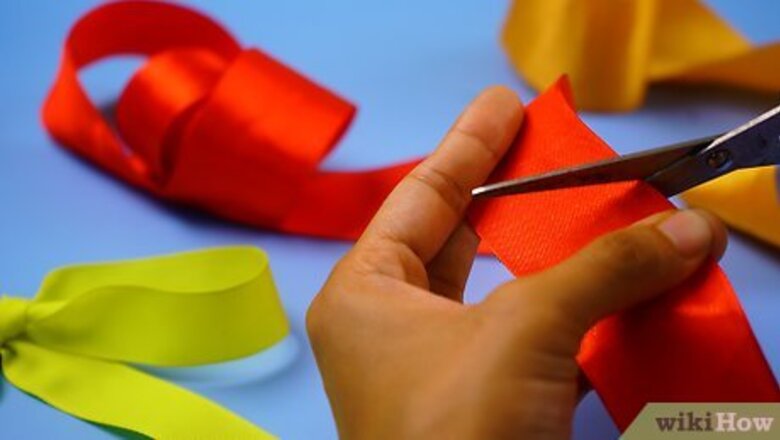
views
Tying a Basic Bow
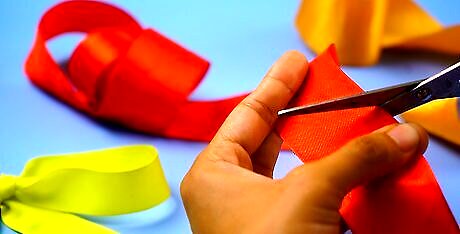
Cut a length of ribbon. Make sure it's long enough for making the bow. Always allow extra for easing the bow into shape and leaving a long enough tail. Lay the ribbon length down on a flat surface.

Bring both tail ends of the bow to the middle. Overlap them and you'll have created two loops and two tails. Shape the loops if they're not evident.

Adjust the proportions. This means checking that both the loops and the tails are the size/length that you want them to be and that they are symmetrical.

Fold the left loop over the right loop. Take it around the back and through the center hole. Pull tightly at the center.

Finished!
Creating a Grosgrain Ribbon Bow
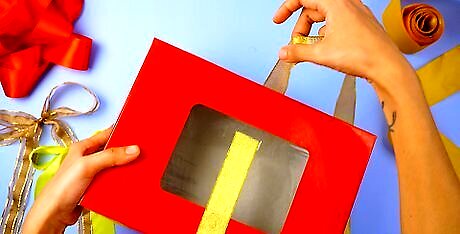
Measure and wrap the ribbon. Cut 6 1/2 feet (2 meters) of grosgrain ribbon. Wrap the ribbon lengthwise around the box. Use glue or tape to join to the box and to join the ribbon but leave the ribbon uncut (you'll continue to work with the long end of the ribbon to make the loops). This bow is ideal for adding to a gift box!

Make a loop with the ribbon. Bring the loop back to the center join. Hold the ribbon in place with a finger. Crease the ribbon length at the loop fold. Fold back to make another loop. Glue/tape in place, if you want. Make one more loop this way.
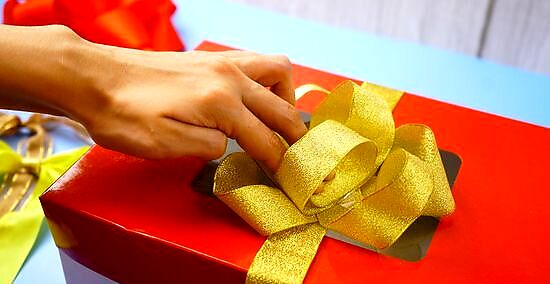
Create more loops. Shift to the other side of the center. Repeat three more loops in the same way, bringing them back to the center and gluing them in place.

Finished!
Making a Wire-Bound Ribbon Bow

Cut a piece of ribbon. This can be used for gift wrapping, floral arrangements, hair accessories and party decorations. Lay the ribbon length down on a flat surface.

Create two loops of ribbon. Bring both halves of the ribbon to the middle and overlap them in the center. There should also be tails at the ends. Hold the ribbon in the center to keep it secure.
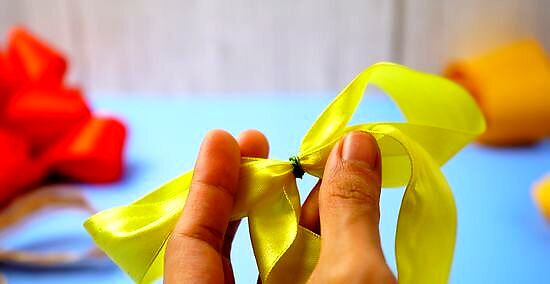
Wrap and conceal the wire. Wrap a fine piece of wire tightly around the middle (neck) of the bow. Wrap ribbon or tape around the wire to conceal it. Use the same color as the bow or a complementary color. Either glue or stitch the wound ribbon piece in place.
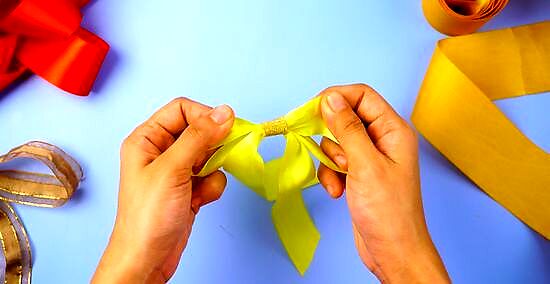
Adjust the loops and tails. Adjust the loops and tails as needed to ensure symmetry. Cut the tails for increased protection from fraying. Add the wired bow to your next gift or wreath.
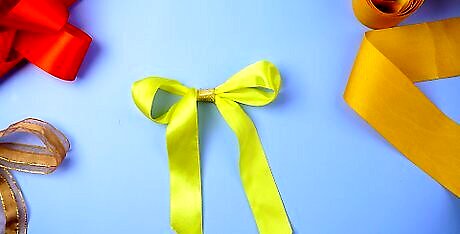
Finished!
Making a Floral Ribbon Bow
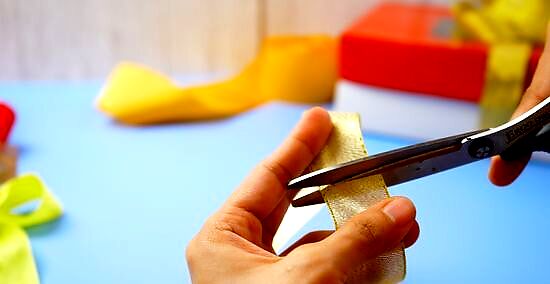
Cut a length of ribbon. Measure a length of 115cm/45 inches. This bow has the appearance of a large flower in bloom. It can be used for decoration, gift wrapping or accessories.
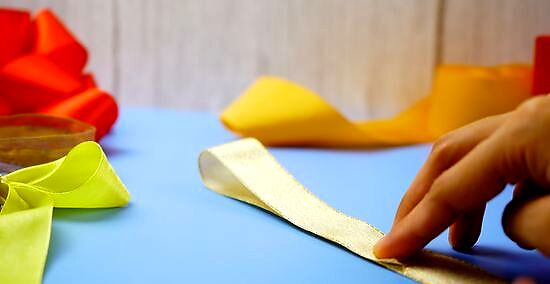
Measure your loops. Make a loop measuring 2.5cm/1 inch 20cm/8 inches in from the end of the ribbon. Pinch it between your thumb and forefinger to hold in place.

Fold the loop. Bring the long end of the ribbon up to make a 2.5cm/1 inch loop on the left of the pinched loop. Keep secure between your thumb and forefinger.

Alternate sides. Make the same loop, only on the right side this time. Continue in this same fashion of making loops, alternating each time to create pairs. Make about three to five paired loops to complete.
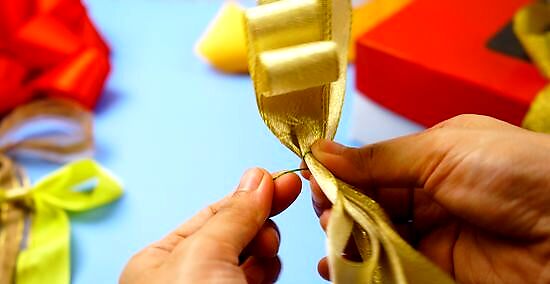
Secure the bow. Wrap thin gauge wire around the center of the bow. Twist tightly to secure and trim off excess wire. Conceal the wire. Wrap ribbon over the wire to cover it. Glue or stitch in place.

Fan out the loops. They should be shaped in a rounded fashion, to give off the appearance of a flower.
Shaping the Tails of Ribbons
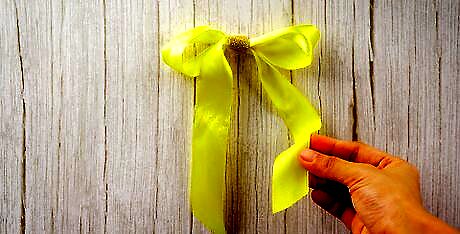
Remember the tails. Along with loops, tails are a distinctive part of how a bow turns out. Not all bow designs have tails, but for those that do, making them appear neat and sharp is important.

Form tails as long as possible. Make sure that the tails are as long as possible when making bows. You can always cut them shorter but it's near impossible to make them longer without ruining the loops of the bow.
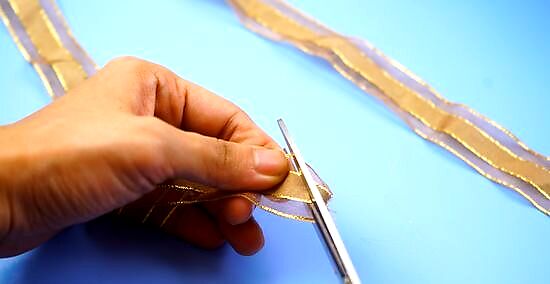
Cut the tails. Cutting the tails prevents fraying of the ribbon and neatens the final look. Use a sharp pair of scissors suitable for cutting fabric. The ends of tails can be cut into distinctive ways: Diagonally: This is a cut along a diagonal line along the tail fabric. Chevron: Choose a center point at the end of the ribbon's tail. Cut diagonally to this point from the left and then the right side. Meet the two in the middle at the chosen point. Carefully remove the cut piece if it hasn't already fallen away.
Choosing the Ribbon

Decide what the bow is for. This will help you choose the ribbon by texture and color. For example: if the bow is to be added to a garment you're sewing or it's part of the accessories accompanying an outfit, match the ribbon to the colors or textures of the clothes.
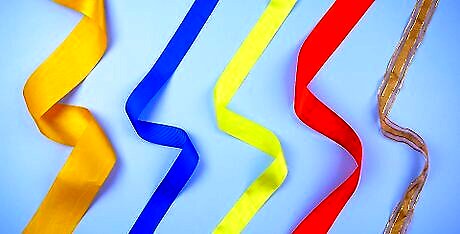
Choose by quality. Satin is a standard type of ribbon used for making bows from but it can be slippery for the novice bow maker. Grosgrain can be an easier beginner ribbon. Prints, velvet, Lurex, cotton, sheers and other varieties of ribbon are all suitable too. Ribbons with wire edges are great for gifts and bouquets. At its most basic, if you can tie the ribbon into a tight knot, then it can be tied into a bow by hand. Some ribbons are too stiff to make into bows without additional help, such as wiring or stitching.

Experiment. Try experiment with different types or ribbons, including different widths, to find the exact style you're after. Always keep in mind that you need a lot of ribbon to make a bow. All the folding and tying consumes a lot of the ribbon.


















Comments
0 comment